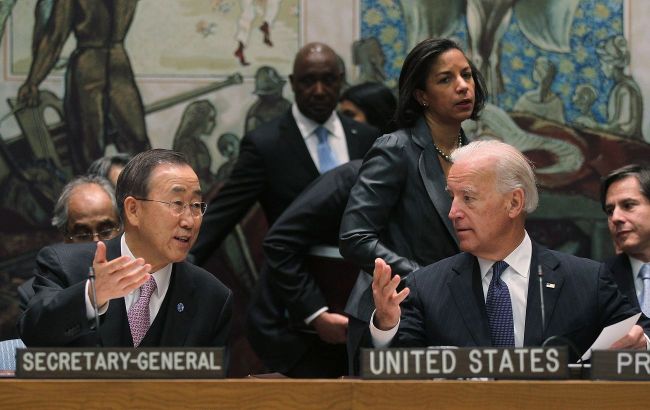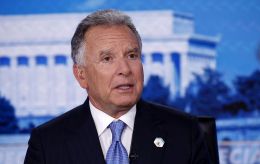New attempt at revival: Can UN Security Council be expanded, and what Biden wants
 Photo: U.S. President Joe Biden will propose expanding the UN Security Council (Getty Images)
Photo: U.S. President Joe Biden will propose expanding the UN Security Council (Getty Images)
The United Nations Security Council (UNSC) is one of the main bodies of the United Nations responsible for maintaining global peace and order. It can initiate military operations with the use of United Nations Peacekeeping Forces, impose and lift sanctions. However, in recent times, especially after the start of the full-scale war in Ukraine, the Security Council has remained paralyzed due to the veto power abused by Russia and China, undermining its ability to function effectively.
Read below about UNSC's history, the reform challenges it faces, and the new proposal from U.S. President Joe Biden.
What is the UNSC and when was it created
The United Nations Security Council was established along with the entire organization in 1945, following the end of World War II. Its formation is provided for in Article 24 of the UN Charter, which is dedicated to the maintenance of international peace and security. The first session took place on January 17, 1946, in London, not in New York. Currently, the UNSC has 15 members - 5 permanent and 10 on a rotating basis.
The UNSC has the authority to issue decisions that are mandatory for all members of the organization (although there are disputes about this). The Security Council is responsible for admitting new members and approving any changes to the Charter.
According to the Charter, this body has the authority to "investigate any situation that threatens international peace" and make recommendations, including military and peacekeeping interventions, sanctions, and the severance of diplomatic relations.
From the outset, the UNSC had five so-called "permanent" members with veto power: China (formerly represented by Taiwan until 1971), Russia (formerly the USSR until 1991, and then Russia simply assumed its place without going through the accession procedure), the United States, the United Kingdom, and France. Gradually, all these countries developed their own nuclear weapons.
.jpg) Photo: The UN Security Council was created to keep the peace after World War II, but was often paralyzed (Getty Images)
Photo: The UN Security Council was created to keep the peace after World War II, but was often paralyzed (Getty Images)
All other seats are occupied by "non-permanent" members without veto power, they rotate. To gain a seat on the Security Council, a country must win a vote in the General Assembly, which requires active lobbying among other UN members. Heads of foreign ministries of member states, UN Special Rapporteurs on various issues, and invited guests, including heads of states, often attend meetings.
The first non-permanent members were Australia, Brazil, Egypt, Mexico, the Netherlands, and Poland. In 1965, their number was increased to ten, and it remains so today. The representative of each member state of the Security Council becomes the president of the body for one month while retaining all the same rights and duties as the others.
The well-known meeting room at the UN headquarters in New York was created by Norwegian architect Arnstein Arneberg (as a gift from his country). The mural depicts a phoenix rising from the ashes - a symbol of the world's rebirth after World War II.
However, most of the Security Council's work is done behind closed doors in the form of meetings and consultations to develop common positions on various international issues. With the advent of television broadcasts, Security Council meetings became of interest to the general public due to sometimes sharp diplomatic confrontations. This tactic, forgotten after the end of the Cold War, returned with Russia's aggression against Ukraine in 2014.
Throughout its history, there have been many calls to reform the Security Council due to its inefficient work and the veto power abused by the five permanent members. However, none of the proposals have been implemented to date.
The problematic history of reform
The paralysis of the UN Security Council is not new - it was also the case during the Cold War. Since then, reform ideas appeared. This concerns mainly increasing the number of members, expanding regional representation, and - most challenging to implement - changing the veto rule.
To reform the UN Security Council, a successful vote by two-thirds of the General Assembly is required. After the fall of colonialism and communism, countries began demanding permanent seats for themselves. The process began in 1992 with Japan and Germany, the second and third-largest economies at the time, Brazil as the largest country in Latin America, and India as the world's most populous country.
 Photo: India is one of the countries with significant chances of obtaining a permanent seat on the UNSC (Getty Images)
Photo: India is one of the countries with significant chances of obtaining a permanent seat on the UNSC (Getty Images)
Interesting fact: India joined the UN even before declaring its independence in 1947, essentially still being a British colony!
These four countries later formed the G4 group to collectively lobby for permanent seats on the UNSC. Currently, there are both supporters and opponents of their cause, mainly due to geopolitical conflicts and historical disputes among these nations.
Italy, Pakistan, Egypt, and Mexico also formed a similar club for themselves called the Uniting for Consensus (also known as the Coffee Club). In the 1990s, others joined, including Canada, South Korea, Spain, Turkey, Argentina, and Colombia. This created two reformist currents that are at odds with each other.
In 2005, the Coffee Club proposed increasing the number of non-permanent members of the Security Council from 10 to 20. Although the idea was eventually rejected, it gained broad support among other UN members and even one permanent member - China.
In the same year, UN Secretary-General Kofi Annan presented his plan:
- Increasing the total number of members to 24
- Adding six new permanent countries
Four years later, Italy came up with a new proposal - creating a new category of seats for 3-5 years for regional alliances, rather than individual countries (similar to how the G20 works with the European Union and the African Union). The African Group proposed allocating two permanent seats to countries on the continent, with representatives rotating.
Currently, India is the country closest to achieving this goal. In 2010, U.S. President Barack Obama publicly supported India's bid for a permanent seat on the UN Security Council. New Delhi has the support of four permanent UN members - the U.S., the UK, France, and Russia, and even China, despite their complex relationship. It also has the backing of dozens of other UN members, including Ukraine.
However, the main problem remains - the veto power, which can potentially block even the best initiatives if they contradict the positions or interests of any of the five major countries. UN Secretary-General Antonio Guterres stated that the "current Security Council no longer reflects the modern world." He criticized the permanent members for "not wanting to continue discussions in the General Assembly."
Even the threat of using the veto can force changes to the text of a resolution or result in its complete withdrawal. Among the ideas to change this were proposals such as not using the veto in matters of global or individual country security, and following Article 106 of the UN Charter on consensus.
Changing the rules for using the veto will be nearly impossible, as the five permanent members can block such a decision (Articles 108 and 109 of the UN Charter). It is unlikely that any of them would vote against themselves.
In 2017, the G4 countries stated that they would abolish the veto if they were granted permanent seats on the UN Security Council. However, this did not happen. The situation would have remained the same if not for Russia's full-scale aggression against Ukraine. The apathy and inability of the Security Council to influence one of its members pushed for new discussions on reforms.
This time, it's coming from the White House in Washington.
What Biden proposes and whether he will succeed
At the upcoming session of the UN General Assembly, scheduled for this week in New York, U.S. President Joe Biden plans to present his ideas for reforming the UN Security Council.
This was announced by John Kirby, Coordinator for Strategic Communications in the Biden administration. Biden insists on including 5-6 new permanent UN members (as proposed by former Secretary-General Kofi Annan), including India, Brazil, Japan, and Germany - the entire G4 group. From Africa, they propose to send South Africa, which could join other states like Gabon and Kenya.
The idea of expanding the UN Security Council has been discussed at least since July of this year, with the main speaker being the U.S. Ambassador to the UN, Linda Thomas-Greenfield.
However, Washington acknowledges that other founding countries do not want to share part of their authority with potential newcomers. Biden has expressed support for limiting the use of the veto "in rare, extraordinary situations."
Ronaldo Costa Filho, Brazil's Ambassador to the UN, who is already retiring, called the current situation "fragmentation of the world order." In his opinion, the Global South deserves a place to "make a significant contribution to preserving the system.

